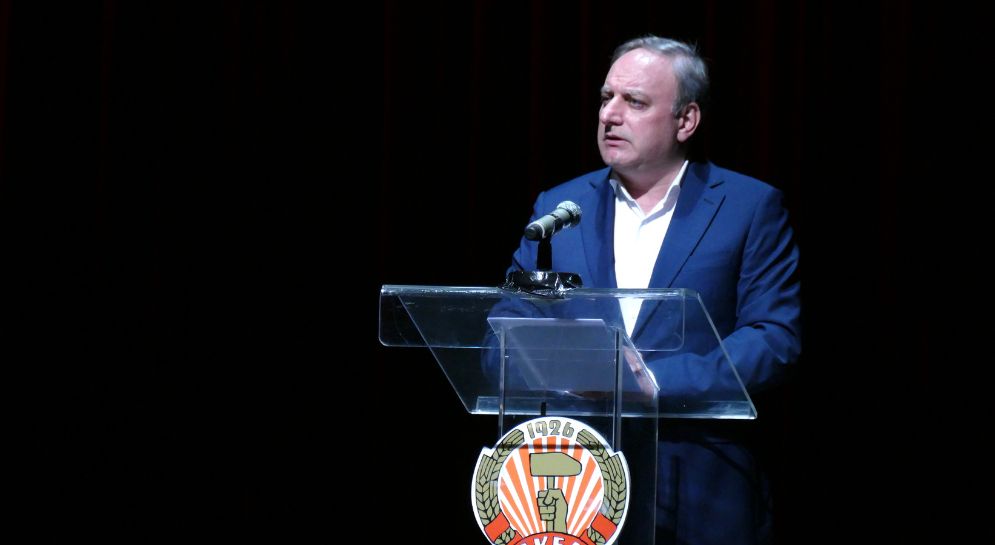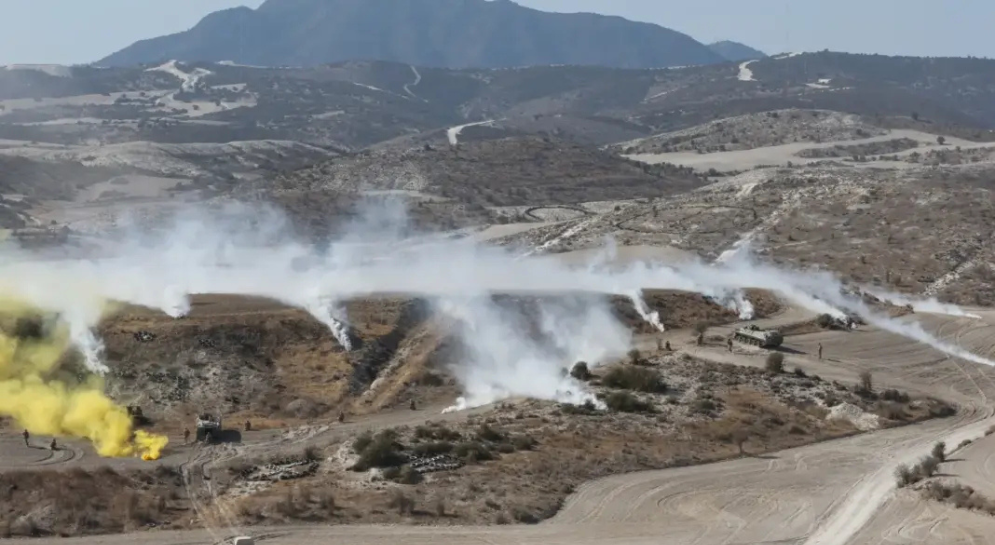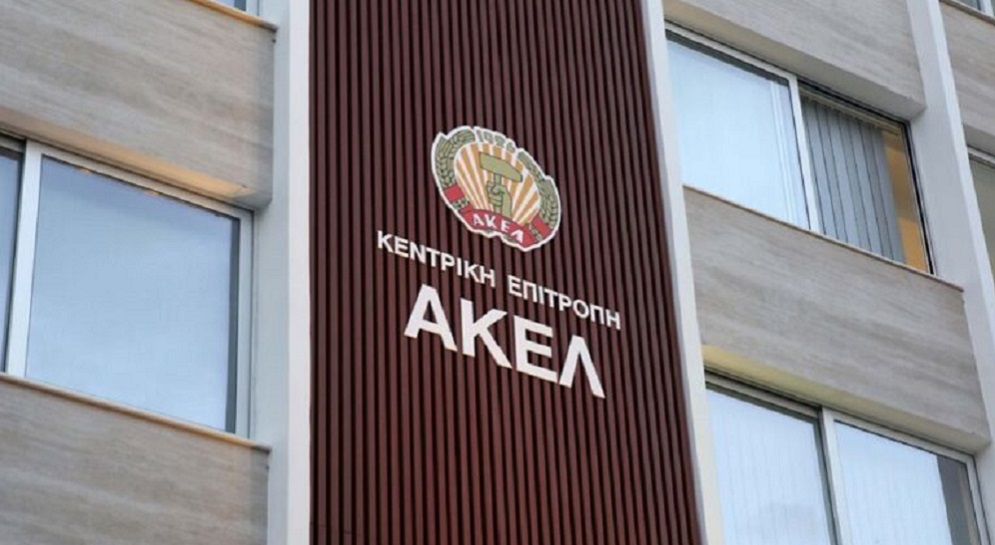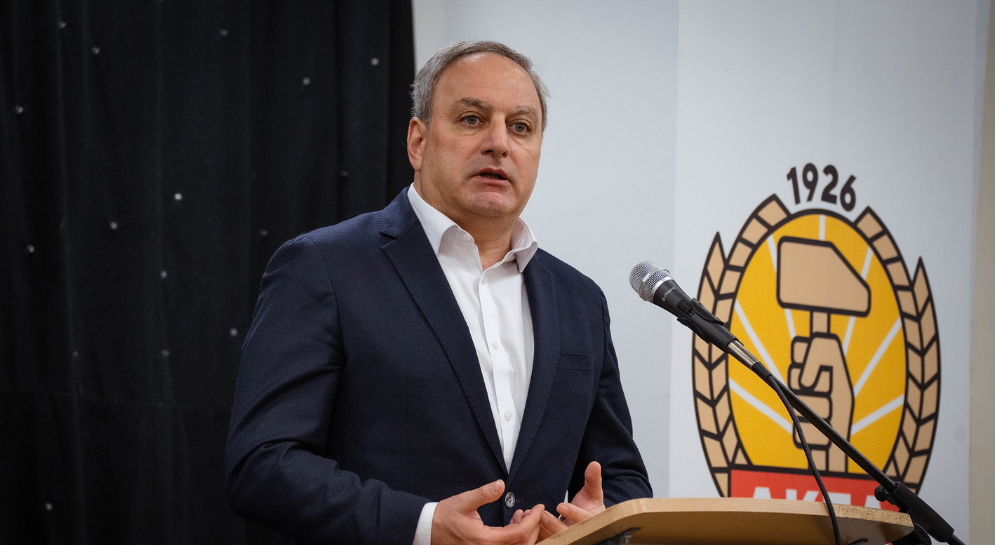
Interview with Stefanos Stefanou, General Secretary of AKEL ‘Ankara is the Decisive Centre in the Cyprus Issue’
AKEL General Secretary Stefanos Stefanou emphasized that there is no doubt that Ankara is the decisive centre for the solution of the Cyprus problem, stating, “Turkey, which unlawfully holds a significant part of the territory of the Republic of Cyprus, needs to make decisive decisions for the solution.” Stefanos Stefanou, the General Secretary of AKEL, answered questions from Hasan Hastürer of Nokta Kıbrıs.
27 March 2024 Cyprus Mirror
Questions and Answers…
H.Hastürer: What do you attribute the lack of sufficient common struggle between Cypriot Turks and Cypriot Greeks in their past?
S.Stefanοu: Cypriot Greeks and Cypriot Turks fought great common struggles in the last century for the rights of their classes, as workers, and for their rights and honor. Cypriot Greeks and Cypriot Turks struggled together for the rights of workers, for the establishment of the legal framework for Social Security, for the eight-hour workday, for the establishment of union pharmacies, and for many other gains that we see today as definite rights and benefit from. However, the most important thing was that Cypriot Greeks and Cypriot Turks lived together in the same jobs, in the same neighborhoods in their daily lives. It was about supporting each other and being in solidarity with each other when needed. For example, during the major earthquake in 1941, Cypriot Greeks and Cypriot Turks worked together to help earthquake victims. The older generations lived under these conditions and still remember how common life was with common struggles, common visions, and common expectations. All of this was then violently interrupted by the developments experienced with the intercommunal conflicts in 1963-64 and then with the tragedy of 1974.
Today, the issue is for the new generation to strengthen the common struggle for peace and reunification for the peaceful coexistence and common future of the Cypriot Greeks and Cypriot Turks.
H.Hastürer: The 1960 Republic of Cyprus was not sufficiently embraced by both Cypriot Greeks and Cypriot Turks. Perhaps this is why it could only exist with its constitutional identity for 3 years. Were Cypriot Greeks and Cypriot Turks not ready for a republic, a common state in Cyprus?
S.Stefanou: The Zurich-London Agreements and the development related to independence created a shock effect for both communities; as the Enosis narrative prevailed in the Cypriot Greek community and the Taksim narrative prevailed in the Cypriot Turkish community. Independence invalidated these dominant narratives. Unfortunately, the dominant elites in both communities did not support the independent state and saw it as a step towards achieving their maximalist goals, Enosis on one side and Taksim on the other. They began to fight against it and undermine it in many ways, leading to the intercommunal conflicts of 1963-64, which marked the first division of territory and population. Later, under the leadership of the right-wing factions, instead of building a bicommunal, bizonal state together, the two communities continued their ethnocentric activities. In this sense, both the Cypriot Greek and Cypriot Turkish communities not only failed to prepare for living together within the framework of a common state but also focused on nationalist discourses and feelings. There were exceptions, primarily from the Left and progressive politicians from the Right, who faced the anger and attacks of nationalists in both communities.
- Hastürer: I don’t want to dwell on the past, but I would like to ask this: When we look at the constitution of the Republic of Cyprus, we are faced with a constitution that perpetuates the division of communities. Whose or whose work was this constitution?
S.Stefanou: The constitution was imposed by the British, who continued the well-known “divide and rule” policy. The signing of the agreements was led by Britain, along with Greece and Turkey. The people of Cyprus, both Greek Cypriots and Turkish Cypriots, were asked to sign it, even with blackmail and threats… There was no effort made in the agreements to serve the interests of the Cypriot people; on the contrary, the aim was to uphold NATO’s interests in the Cold War context. The concern of the British and NATO was for Cyprus to remain under Western influence and to prevent AKEL from dominating internally, and it is said that Karamanlis and Menderes secretly agreed on this.
The Cyprus Constitution indeed contains unprecedented international obligations as well as many divisive elements, and I am not including the two-communal character among them.
If there had been the necessary political will from the leaderships of the two communities for the functioning of a bicommunal state, these problems could have been countered. But there was no such will because independence was beyond their visions and goals.
With the undermining of the state by clandestine power centres within, with the activities of nationalists in both communities, with external interventions by the Anglo-American factor, the 1963-64 conflicts, and the double crime committed against Cyprus in 1974, culminating in the coup by the Athens Junta and EOKA B and the invasion by Turkey.
- Hastürer: While Turkish Cypriots were forced to migrate and become victims after December 21, 1963, what was AKEL’s approach? Or why couldn’t it clearly articulate a different stance?
S.Stefanou: AKEL always strongly opposed the nationalist policies that caused problems and bloodshed in our homeland. During the period of nationalist frenzy created in 1963-64, AKEL emphasized the need to restore relations between Greek Cypriots and Turkish Cypriots, the return of Turkish Cypriots to state institutions, and the need for all of us to work to support and strengthen our independence.
AKEL also worked to protect the Turkish Cypriot community and to be supported tangibly by the state.
It is undeniable that AKEL’s support for the Enosis policy between 1964-1968 was a contradiction. This was a wrong attitude, and indeed AKEL later made self-criticism about this stance.
Hastürer: Negotiations aimed at finding a solution to the Cyprus problem have continued despite interruptions. All political views have been influential at the negotiating table. However, a solution has not been reached. Why?
S.Stefanou: This question cannot be answered in just a few lines. But briefly, I can say this: each period needs to be evaluated based on the international situation, the situation in Cyprus, the balance of power between the two communities, and who is in leadership positions in the communities.
It is an undeniable fact that particularly in the two years when Christofias and Talat were together in the process, many important rapprochements were achieved during the period when the negotiations were under the control of Cypriots in their property.
I also want to say that in other periods, it can be said that historic opportunities for the solution of the Cyprus problem were missed. However, we should not dwell on the past but look to the future. We need to invest in the negotiating acquis built over years of negotiations, of course, based on the rapprochements achieved by Christofias and Talat, continuing from where the negotiations were left off at Crans Montana and reaching a comprehensive solution.
Hastürer: If AKEL and CTPwere to come together again at the negotiation table, what would happen?
S.Stefanou: I am sure that if AKEL and CTP were to come together again at the negotiation table, they would overcome the deadlock and continue the negotiations based on the negotiating acquis, including rapprochements such as political equality, rotating presidency, and the requirement for at least one positive vote of Turkish Cypriots in all decisions of the Council of Ministers, and aiming for a comprehensive solution, continuing from where they left off at Crans Montana, crossing the last mile remaining, and achieving a strategic agreement.
Hastürer: Cyprus Republic officials and even EU officials are concerned about the elevation of the status of Turkish Cypriots when establishing contacts with them, fearing that it would strengthen the status of the TRNC. Isn’t this an unfair attitude towards Turkish Cypriots?
S.Stefanou: It is necessary to distinguish the Turkish Cypriot community, which is not recognized internationally based on the relevant decisions of the UN Security Council, from the illegal formation. Of course, the Turkish Cypriot community should be supported, and to the extent permitted by the abnormal situation in Cyprus since 1974, it should benefit from the accession of the Republic of Cyprus to the EU. However, at the same time, we cannot accept policies that would strengthen the position of the illegal formation on the island, as this would lead to the strengthening of division.
Hastürer: While referring to Turkey as an ‘occupier’ on one hand, isn’t it inconsistent from Greek Cypriot politics to pursue every kind of normal relationship with Turkey, from sports to economy and political meetings?
S.Stefanou: I do not see any inconsistency in this regard. Turkey invaded Cyprus in 1974 and illegally holds a large part of the territory of the Republic of Cyprus. It enforced a separation of territory and population between Greek Cypriots and Turkish Cypriots by force of arms. The Republic of Cyprus does not deny Turkey; on the contrary, it is the other way around. Therefore, we insist on solving the Cyprus problem because with a solution, the occupation will end, diplomatic relations between the two countries will be restored, and cooperation between the two countries will be made possible. No one can change geography. But neighborhood conditions can be changed.
Hastürer: How do you evaluate the appointment of Maria Angela Holguin Cuellar as the Personal Representative of the UN Secretary-General for Cyprus and her subsequent contacts?
S.Stefanou: The appointment of Mrs. Maria Ángela Holguín Cuéllar as the Personal Representative of the UN Secretary-General in Cyprus is a positive development. Of course, what matters here is to open the way for a solution to the deadlock and to resume negotiations based on the Guterres framework and all the rapprochements reached through long negotiations. We need to invest in the negotiating acquis, continuing from where the negotiations were left off at Crans Montana, aiming for a solution based on the Guterres Framework, which would reunite our country and our people, Greek Cypriots and Turkish Cypriots, in a federal, independent, sovereign, and demilitarized state, where all Cypriots can enjoy human rights and fundamental freedoms.
Hastürer: When we look at Christodoulides’ statements, he sees negotiations not as a means but as an end. Do you find Christodoulides’ views on the Cyprus problem consistent? How close are they to AKEL’s views on the solution to the Cyprus problem?
S.Stefanοu: Everyone is evaluated not based on their statements but on their actions. We do the same. We expect consistency from Mr. Christodoulides in what he expresses, namely, the continuation of negotiations based on the Guterres framework and the convergences reached. We want him to take concrete initiatives on a positive agenda focusing on the region’s energy issues and Cyprus’s natural gas to bring Turkey back to the negotiating table. Therefore, we have presented him with a concrete proposal.
Hastürer: Who holds the key to the solution in the Cyprus problem?
S.Stefanοu: There is no doubt that the decisive centre for the solution of the Cyprus problem is Ankara. Turkey, which illegally holds a significant portion of the territory of the Republic of Cyprus, needs to make decisive decisions for the solution. Of course, this reality does not eliminate the role of the two communities in reaching a solution. If both communities, especially their leaders, exert pressure for a solution, this pressure is transmitted to other stakeholders, including Turkey. If the leaders of both communities make progress and agree on the internal issues of the Cyprus problem, the pressure for a solution will be much greater.
Hastürer: How would you summarize AKEL’s views and approaches that differentiate it from other Greek Cypriot political parties in its approach to Turkish Cypriots in the Cyprus problem?
S.Stefanοu: I can say many things, but I will limit myself to two fundamental points: Firstly, AKEL is very clear and consistent regarding the agreed-upon basis for a bicommunal, bizonal federal solution. Also, it is very clear and consistent about how to overcome the deadlock in the Cyprus problem since 2017. Secondly, AKEL always tries to put itself in the shoes of not only Greek Cypriots but also Turkish Cypriots. It is important to include and consider the reasonable concerns of the Turkish Cypriot community in the negotiation equation.
Hastürer: When you think of the Turkish side in the Cyprus problem, do you think of northern Nicosia or Ankara?
Stefanοu: Ankara. “Cyprus belongs to the people of Cyprus.” It belongs to Greek Cypriots and Turkish Cypriots. This is a life maxim, a life motto for me. In my opinion, not even a corner of Cyprus can be considered the property of Ankara or any other state.
Hastürer: What are AKEL’s red lines in a possible solution?
Stefanοu: We believe that the only solution that will offer a real way out is the bicommunal, bizonal federal solution with political equality as specified in the United Nations resolutions. Within this framework, single sovereignty, single international identity, single citizenship, and the protection of human rights and fundamental freedoms for all Cypriots can be ensured.
Hastürer: If I asked you to name three Turkish Cypriots who have left a mark on your political memory, who would you mention? Why?
Stefanοu: I can mention many Turkish Cypriots because there are many who have fought and continue to fight for the vision of a free and peaceful common homeland for Greek Cypriots and Turkish Cypriots. Since you asked me to name three, I will mention Derviş Ali Kavazoğlu, Ayhan Hikmet, and Ahmet Sadi. All three were shot by TMT for fearlessly opposing partition plans and passionately advocating for the friendship and cooperation of our people. Two of them were killed, and one was wounded.
Hastürer: What do you say about the European Parliament elections and Niyazi Kızılyürek’s re-candidacy from AKEL?
Stefanοu: In 2019, including our Turkish Cypriot citizen on AKEL’s candidate list was a historical step consciously taken by us. This step is a clear and strong political response to those who claim that Greek Cypriots and Turkish Cypriots cannot engage in political cooperation. It is also a strong indication that there can and should be cross-voting, as agreed upon between Christofias and Talat, not only because of the common past but also because of their common vision for the future. It has been proven that Niyazi Kızılyürek’s presence in the European Parliament is beneficial for both the Turkish Cypriot community and Cyprus as a whole.
Hastürer: Do you have a message for Ankara, northern Nicosia, Recep Tayyip Erdoğan, and Ersin Tatarregarding the Cyprus problem?
Stefanοu: After half a century, it is time to turn the page. And for this page to be turned, the Cyprus problem must be resolved. A solution will be beneficial to everyone, including Turkey. Cyprus can become a bridge of peace and cooperation in the region; a state where people with different languages and religions but with a common history and expectations live together freely, in a federal, independent, sovereign, and demilitarized country, building their common future together in peace and security.





